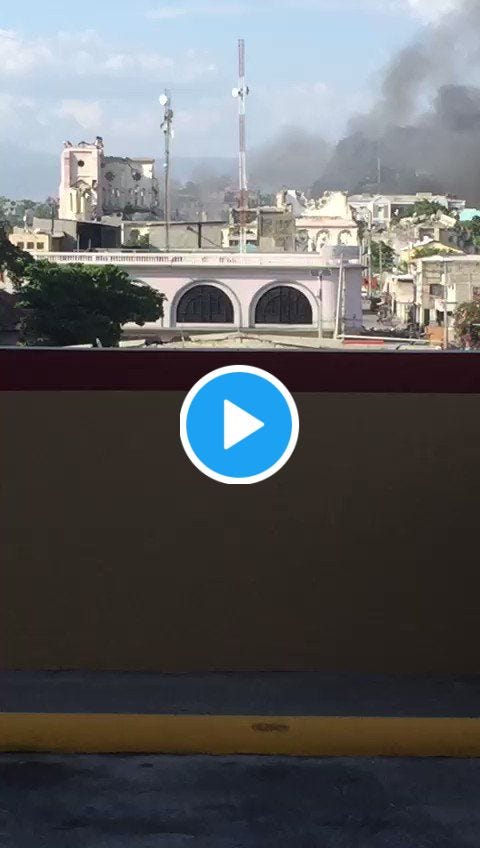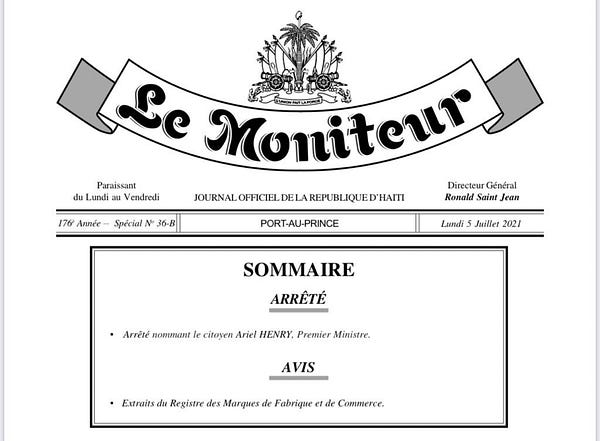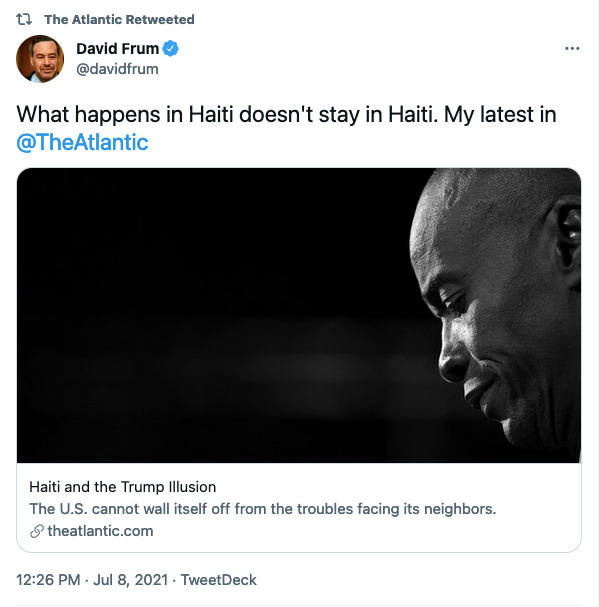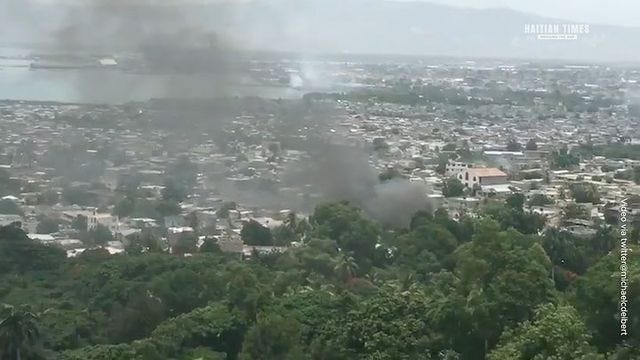Bonjou. Welcome to the latest edition of Woy Magazine’s weekly newsletter, providing you with must-know news and commentary on Haiti and our Diaspora.
**Trigger Warning for this week’s content**
Death of a Salesman
On Wednesday, the world woke up to the news that de-facto leader Jovenel Moïse had been assassinated in his home earlier that morning.
Moïse’s death is rattling an already fragile country, leaving Haitians feeling more unsafe and unsure about the future now more than ever before. The fact that the head-of-state could be killed so easily in his home has made it clear to many that no one is truly safe in Haiti.
Immediately after the news broke, an international game of “who done it?” commenced with the story now being that foreign mercenaries, including 26 Colombians, a couple of Americans, and some locals are to blame.
Many Haitians were quick to call out the irony of the Haitian National Police (PNH) being so quick to find those allegedly responsible for Moïse’s death as many previous high-profile killings, including that of Mèt Monferrier Dorval (who was shot and killed in his home which is in the same neighborhood as Moïse’s home), Evelyne Sincere, Gregory St. Hilaire, and even that of their very own colleagues who died during the Vilaj de Dye mission remain unsolved. There’s also the case of Matisan, Site Solèy and other parts of the greater Port-au-Prince region are still under the complete control of gangs, crippling parts of the capital and displacing thousands of men, women and children in the process.
As the population stayed home and grappled with the news, violence continued in the capital on Wednesday as gunfire and smoke could be seen in Petionville…
…and in Matisan…
Isn’t it Ironic?
It is the irony of ironies that Jovenel Moïse fell victim to the very same insecurity he perpetuated and supported since he took office.
In a new op-ed, respected writer Lyonel Trouillot sharply made this point, calling for an end to the legal banditry that continues to hold Haitians of all backgrounds hostage:
La mise à mort de toute vie institutionnelle, le recours au banditisme par le pouvoir ont conduit à cette situation de terreur. Le président de facto est une victime d’un climat qu’il a lui-même instauré. (Source: Rezo Nòdwes)
Poet and author Jean D’Amerique touched upon a similar theme in his post-assassination reflection, as well:
J’ai compris là une chose : notre pays a été détruit, et maintenant il détruit chaque individu, personnellement. Il détruit chaque être, dans son lieu le plus intime.
Depuis la peau jusqu’aux entrailles les plus profondes, depuis la sève jusqu’aux plus lointaines racines, c’est le règne du sang. Voilà. Ne me demandez pas comment je vais, ne me demandez plus les nouvelles de mon pays.
For the month of June alone, Le Centre d’Analyse et de Recherche en droits found that more than 150 assassinations and nearly 200 kidnappings have been recorded across the country. Just a week before Moïse was killed, feminist activist Antoinette “Netty” Duclair and journalist Diego Charles were shot to death in Diego’s yard, while along with 13 others were shot to death along Delmas 32.
While in power, Moïse continually blamed the violence on illusive political opponents even as both domestic and international papers alike alluded to the role his administration played in supporting gang leaders like Jimmy Cherizier, especially surrounding massacres that took place in poor and working class communities like Bèlè and Matisan.
Olrich Jean Pierre, an anti-government corruption activist shared his understanding of the situation, “No one should be shocked about the resurgence of violence in the last few months. We are used to PHTK’s tactics. Whenever a movement seems to be starting, the violence resurges. Today it is more dire because the government has used the federation of gangs to create panic, and to stop people from mobilizing. (Source: Woy Magazine)
Long Live the Boogeyman
So what is the legacy of Jovenel Moïse, exactly?
While to some he is a martyr — a humble businessman who only sought to do what’s best for his country, the facts surrounding him paint a larger, more disturbing picture.
First, there’s the issue of insecurity. Haiti’s kidnapping crisis has ballooned out of proportion. According to Alterpresse, the country witnessed 142 recorded accounts of kidnappings alone in the first three months of 2021. A June article from Forbes reported that the number of kidnappings within the first quarter of the year increased by 150% as compared to last year’s numbers. And no one has been spared: Catholic clergymen, Adventist church members, Dominican filmmakers, doctors, respected scholars, students and tons of others have all fallen victim to this violent trend.
Then there are the massacres. Since 2017, there have been more than a dozen massacres in Haiti, targeting mainly poor and working class communities. In April, the neighborhood of Bèlè suffered its third massacre in the span of two years, leaving many of its inhabitants assaulted, raped, killed, displaced and homeless.


We cannot forget the incredible food insecurity which also took place under Moïse’s reign. Just one day before his presidential term was slated to end under the Haitian Constitution, UNICEF warned that the number of children under the age of 5 suffering from acute malnutrition could more than double this year, meaning more than 80,000 children are expected to go hungry in 2021 versus the 40,000 who did in 2020.
Of course there is also the chipping away at the country’s democratic institutions. Up until his death this week, Moïse had been ruling by decree since he let Parliament lapse in early 2020, and infamously gutted the Court of Auditors - the very institution that was investigating the whereabouts of the PetroCaribe funds.
To round off the list, there is the Moïse government’s complete mishandling of the COVID-19 pandemic. Even as neighboring countries canceled all carnival plans, Moïse and his administration went full-steam ahead with in-person festivities in the Northwest of Haiti, an area that has suffered from incredible government negligence in the past when it comes to infrastructure and wellness. When Haiti’s spike began a few months later, the government took little precautions to curb the spread of the virus, even as hospitals continually reported being over capacity, while gang violence forced some COVID treatment centers to shut down entirely.
Who Wants to be King?
Jovenel Moïse may be dead, but he is now one of many ghosts haunting Haiti’s present and future. After relentless attacks on the legislature and judiciary, his death now leaves the presidency, the democratic institution Moïse represented weakened, and a power vacuum that raises the question, “who is in charge?”
Il n’est pas clair ce qui devrait se passer légalement, ni qui doit prendre les rennes du gouvernement. « Je n’ai aucune information sur ce qui s’est passé » déclare Samuel Madistin, un des responsables de la Fondation Je Klere. Qui est président du pays, légalement ? « On est dans la confusion. Les gens qui ont fait ce coup ont-ils un projet politique ? Nous ne le savons pas. Sont-ce des mercenaires délégués pour faire une attaque. Personne ne le sait. On est plus dans une démarche légale. Jovenel Moise avait déjà démantelé toutes les institutions du pays. » (Source: Ayibopost)
As it currently stands, there are only 10 elected officials in the Haitian government, all of them being Senators due to his decision to let Parliament lapse. The institution that could’ve helped fill the gap left open by him - the Court of Cassation - sits practically defunct since its head judge, René Sylvestre, recently died of COVID.
Then there’s the battle of the dueling prime ministers.
Former interim prime minister Claude Joseph is now the country’s #1 guy, even though, only a few days ago he bowed out of the position to make way for Moïse’s last appointed prime minister, Ariel Henry.


But now, Joseph, with the blessing of the United Nations Special Envoy to Haiti, is said to remain prime minister of the country until elections are held in September. Immediately after the assassination, Joseph declared Haiti to be in a “state of siege,” throwing the country into full lockdown.


However, Ariel Henry is not staying silent, as he is still claiming his right to the role Moïse appointed him to before he died. In an interview with Le Nouvelliste, Henry defended his position:
Pour Ariel Henry, Claude Joseph n’est plus Premier ministre. « Selon moi, il n’est plus Premier ministre. Il y-a-t-il plusieurs Premiers ministres nommés dans le pays ? », a-t-il demandé.
He also spoke out against Joseph’s “state of siege” declaration:
Cependant, Ariel Henry ne partage pas certaines décisions prises par Claude Joseph ces dernières heures notamment l’état de siège qu’il a décrété sur tout le territoire. « Je ne pense pas qu’on soit dans une situation qui nécessite l’état de siège. Je pense que c’est un peu précipité. C’est mon point de vue », a-t-il soutenu.
As we wait to see how the two prime ministers work out this conundrum, there are also calls for representatives of the popular sector to take the reins and finally have a say in the future direction of the country, hopefully leading with a people-first agenda:
…we need to take on different actions that concretely contribute to a people’s agenda. What if instead of scrambling for news on Haiti and deciphering the real issues from the analyses and opinions of international Haiti experts, we supported the Haitian people’s efforts to tell their own stories and share their own dreams directly with us? (Source: NACLA)
The Last Decree
We should note that prior to his death, Jovenel Moïse issued a last presidential decree which overrides a constitutional and Parliamentary rule that allows for the parliamentary body to provide a “décharge” to all former prime ministers, they have been found to have committed no acts of financial fraud or thievery. Moïse, in a nutshell, provides a blank slate to any person who handled or oversaw public funds since 1991.
To many, this decree is the last, serious blow dealt by the former president to the movement demanding lawmakers and officials account for the missing funds of the PetroCaribe program and it opens the way for many to run for office.
In a throwback piece reposted by Rezo Nòdwes, we’re reminded that millions of dollars resulting from the Venezuelan program went missing or unaccounted for although officials claimed the money was spent on development projects for things like schools, hospitals, and the development of sports stadiums across the country:
Le total des résolutions adoptées pour l’exécution des travaux de réhabilitation de 18 parcs sportifs, totalise 36 241 633.59 USD et les montants transférés atteignent 27 787 385.59 USD, a indiqué le rapport de la Cour ayant constaté que les modalités de facturation et de paiement ne sont pas adéquates en référence à l’article 130.3 de l’arrêté d’application du 26 octobre 2009 de la loi du 12 juin 2009 sur les marchés publics.
Something Wicked This Way Comes
Unsurprisingly, the assassination of Jovenel Moïse have renewed the calls by some for a new foreign occupation of Haiti. In fact, the Washington Post - the very same paper that detailed Jimmy Cherizier’s reign of terror - published a piece from its editorial board calling for the U.S. and other international bodies to “intervene” in Haiti’s domestic woes. The piece even went as far as to say that the last UN occupation — which resulted in a massive cholera pandemic that killed thousands and the sexual abuse of hundreds of women and children — brought a “modicum of stability” to Haiti.
Stability for whom, though?


It is no secret that much of Haiti’s ills can be traced back to previous foreign occupations. The last U.S. Occupation was preceded by the assassination of another Haitian president, under the guise of wanting to restore order, similar to what is happening now. What followed was years of weakening of Haitian institutions and the senseless killings of many Haitians.
The Public Archive has a published list of some of the known crimes that U.S. troops committed in the first half of the 20th century against the Haitian people. Here are a few:
Near Marin, at Collier, district of Mirebalais, the same band cut the head off a blind man named Néis, 25 years old, and did the same thing to a child who was with him, named Jules Louisville.
On January 25, 1919, at “Savane Longue,” near Marin, a group of marines and gendarmes coming from Terre-Rouge, district of Mirebalais, killed Hon. Auré Bayard, who was ill in bed. They pulled him from his bed, and shot him through and through.
Be sure to check out this past episode of Woy’s podcast, Epizòd, where the magazine’s co-founder talks to Alain Martin to remember the Occupation:
No Innocent Bystanders
As western papers pump out article after article covering the assassination, you’re bound to read some iteration of the long-used phrase “the poorest country in the Americas” over and over. However, we cannot fall for the mischaracterization of the roles the U.S., Canada and other foreign powers have played in Haiti’s demise.
Articles like that of the Washington Post would have you believe that these countries and multi-national organizations are mere bystanders and witnesses to Haiti’s issues.


However, that could not be further from the case.
Joe Biden, like Donald Trump, like Barack Obama, like George W. Bush, like Bill Clinton and so on, as well as their Canadian and French counterparts have worked tirelessly to undermine Haiti’s sovereignty. From deregulating the nation’s agriculture productions to the blatant kidnapping of a former Haitian head of state, they have taken every initiative to render the country broken and unstable.
While David Frum may believe Joe Biden can behave differently towards Haiti than his predecessor, truth-be-told he has not chosen to do so:
During his own campaign, Biden stated that “The Trump Administration is abandoning the Haitian people while the country’s political crisis is paralyzing that nation.” Yet, under the Biden administration, there has been no sign of significant change in policy toward Haiti. Though the Biden administration did grant Temporary Protected Status (TPS) to Haitian migrants this spring, in its first few months in office, the new administration deported more Haitians than the Trump administration did in the entirely of fiscal year 2020. (Source: Center for Economic and Policy Research)
As Canada does its best to be seen as the “friendly” of North America, it certainly has not behaved this way when it comes to Haiti. As Professor Marlene Daut reported for Woy Magazine, in 2017 the Boston Globe published an op-ed where Boston College law professor Richard Albert urged Haiti “to assign its “sovereignty” to a “majority-white country” like Canada.” In the same piece, Daut reminds us that Canada banded with the U.S. to disregard Haiti’s authority over itself to “have Aristide literally removed from the country after the popular uprising that unseated him in February 2004.” However one personally feels about the former president, the way he was dealt with should’ve been handled and decided upon by the Haitian people.
The Western propaganda doesn’t end with the language used to describe Haiti. It also shows up in the figures that major networks like CNN and PBS choose to interview during this critical time. Despite their ties to a corrupt party, these platforms are giving air-time and softball interviews to people like Ambassador Bocchit Edmond and former prime minister Laurent Lamothe. We hope viewers will remain vigilant in their intake of information on this ongoing story and do their best to decipher fact from fiction.
In solidarity.
For more content be sure to visit us at woymagazine.com and follow us on Twitter at @woymagazine.







RastafarI love. Thanks for a great article about the situation in Ayiti at this time. I just want to add the the UN Peacekeepers were guilty of raping boys and young men. And, Ayiti is probably the most impoverished Nation State in the Western Hemisphere and even though I get sad when folks repeat the phrase over and over, I accept that it is true! We continue to expose the corruption but poverty will not be eradicated without proper development of institutions and the valuing of the people. I’m a person of Ayiti descent, I’m also impoverished and homeless in NYC where I was born. There are hundreds of thousands of Haitians in this City and in the U.S. but, no one has really tried to reach out and help me and the many others who face this crisis. A few donations will not help! Ayiti is impoverished because of the same existential malaise that I experience, we both dared to be free! Blessed love.#1804 #Ayiti